Some dogs wear their stress like a badge—anxious, nervous, and constantly on edge.
From the tiniest lap dogs to the mightiest guard dogs, certain breeds seem to live in a state of perpetual worry. They twitch at every sound, cower at every unfamiliar face, and sometimes struggle just to relax.
But it’s not their fault. Genetics, past experiences, and even their surroundings can push these pups into stress overload. But don’t worry, we’ve got the tips to help them find their calm.
Understanding your dog’s triggers and offering the right kind of support can turn anxious behaviors into moments of peace. Ready to help your stressed-out pup chill? Let’s dive into the breeds that need a little extra TLC and the ways you can keep them relaxed.
Chihuahua
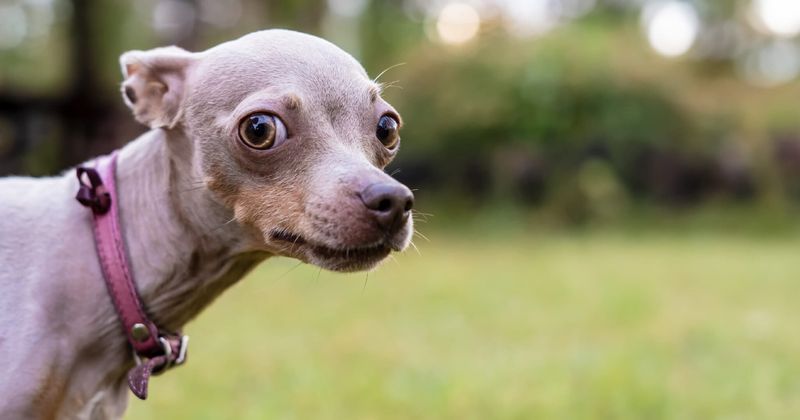
Chihuahuas, famed for their tiny frames and lively personalities, can be more prone to stress due to their size. Their small stature often makes them feel vulnerable, especially in busy environments. To help your Chihuahua stay calm, create a safe space within your home where it can retreat from chaos.
Engage with them using gentle and consistent training methods. Regular walks in quieter areas can also help, allowing them to explore without feeling overwhelmed.
Socializing them with other small dogs can boost their confidence, reducing stress levels over time.
Cavalier King Charles Spaniel

The Cavalier King Charles Spaniel, known for its affectionate nature, often experiences stress when left alone for extended periods. This breed thrives on companionship and can become anxious without human interaction. To alleviate this, ensure they have company during the day or consider doggy daycare services.
Introduce them to interactive toys that stimulate their minds, keeping them occupied when you’re away.
Regular physical activity, like short strolls in familiar areas, can also ease their anxiety. Consistent routines can further provide a comforting sense of stability.
Border Collie

Border Collies, renowned for their intelligence and energy, may become stressed without adequate mental stimulation. Their need for activity and purpose is paramount. Engage them in agility training or puzzle games to channel their intelligence positively.
Long walks, combined with obedience training, can keep their minds and bodies active, reducing stress significantly.
A routine that includes varied activities will also ensure they remain engaged and content. Providing a task, such as herding exercises, can satisfy their intrinsic need to work, making them happier in the long run.
Jack Russell Terrier
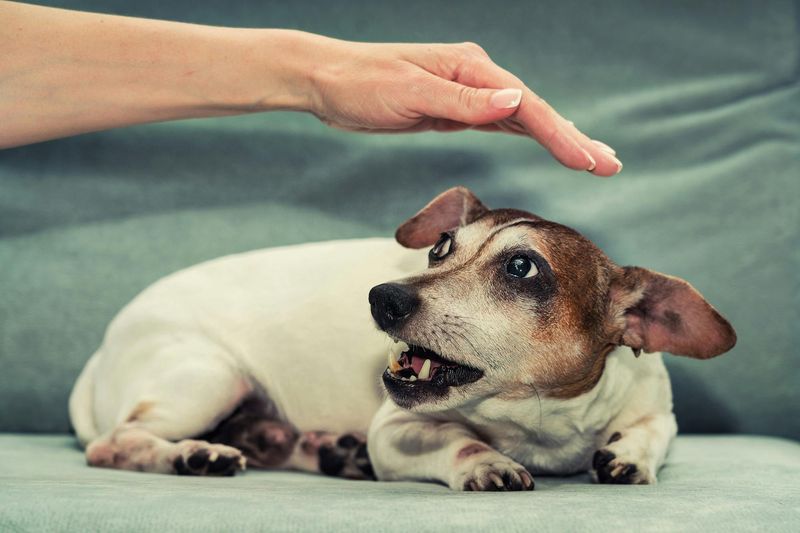
Jack Russell Terriers, bursting with energy, can become stressed when their abundant energy isn’t adequately channeled. These dogs flourish in active households where they can participate in various activities. Engage them in games like fetch or flyball to tire them out physically.
Mental challenges, such as hide-and-seek or advanced obedience training, can also help.
Creating a daily routine filled with different exercises and playtimes can prevent frustration. They thrive on engagement and can become anxious when bored, so varied stimulation is key to keeping them calm and content.
Bichon Frise

The Bichon Frise is a sociable breed that can experience stress when isolated from family. Their need for companionship makes them susceptible to separation anxiety. To mitigate stress, ensure they receive plenty of attention and interaction.
Regular grooming sessions can also serve as a bonding experience, offering comfort and reducing anxiety.
Introducing play dates with other dogs can fulfill their social needs and keep them engaged. Consistency in daily routines further helps in providing a sense of security, ensuring they remain happy and relaxed.
Yorkshire Terrier

Yorkshire Terriers, with their spirited personalities, often face stress when their environment is too chaotic. These small dogs prefer calm and orderly surroundings. Create a peaceful corner in your home where they can retreat from noise and commotion.
Regular short walks in serene areas can provide the exercise they need without overwhelming them.
Keeping a consistent routine, with set feeding and walking times, can also help reduce anxiety. Introducing them gradually to new environments or people ensures they feel secure and less stressed, promoting a sense of calmness.
Pekingese

Pekingese dogs, known for their royal demeanor, can easily become anxious in unfamiliar surroundings. Their affinity for comfort means changes in their environment can be stressful. To ease their anxiety, maintain a stable and comfortable home setting.
Introducing new experiences slowly and gently can help them adapt without feeling overwhelmed.
Providing them with a cozy bed in a quiet area ensures they have a sanctuary to retreat to. Regular grooming not only keeps them looking royal but also provides a soothing interaction that can help calm their nerves.
Maltese

The Maltese, with its luxurious coat, often feels stress due to grooming-related activities. To minimize anxiety, introduce grooming routines gradually, making the experience positive with treats and gentle care.
Regular walks in calm, familiar areas offer a sense of security, reducing stress.
These dogs thrive on companionship, so spending quality time playing or simply being present with them can ease anxiety. Creating a quiet, cozy space for them to relax in can also provide comfort, ensuring they feel secure and cherished, keeping stress levels at bay.
Shih Tzu

Shih Tzus, with their charming looks, can become stressed if not handled with care. Their sensitive nature means they thrive in peaceful environments. Create a tranquil home setting, free from loud noises or abrupt changes.
Regular, gentle grooming and walks in familiar areas can reduce anxiety.
Their social nature also makes them susceptible to separation stress, so ensure they have company or interactive toys when alone. Providing a consistent routine with predictable activities can offer comfort and stability, ensuring they remain calm and content.
Italian Greyhound

Italian Greyhounds, known for their elegance and sensitivity, often feel stress in cold or unfamiliar environments. Their thin coat offers little protection, making warmth a priority. Keep them comfortable with cozy, warm bedding and sweaters for chilly weather.
Gentle handling and quiet environments suit their sensitive nature best.
Daily walks, combined with playtime in secure, enclosed areas, keep them engaged and happy. Providing a routine that avoids sudden changes ensures they feel secure and protected, minimizing stress while enhancing their elegant grace.
Weimaraner

Weimaraners, noted for their athleticism, can become anxious if not given ample exercise. They require space and activity to thrive, making regular long walks and runs vital. Engage them in activities like hiking or agility training to satisfy their high energy needs.
A strong bond with their owner provides emotional security, reducing stress.
Consistency and positive reinforcement in training can help manage their enthusiasm, ensuring they remain calm and balanced. Creating an environment where they feel part of the family keeps them happy and stress-free.
Miniature Pinscher
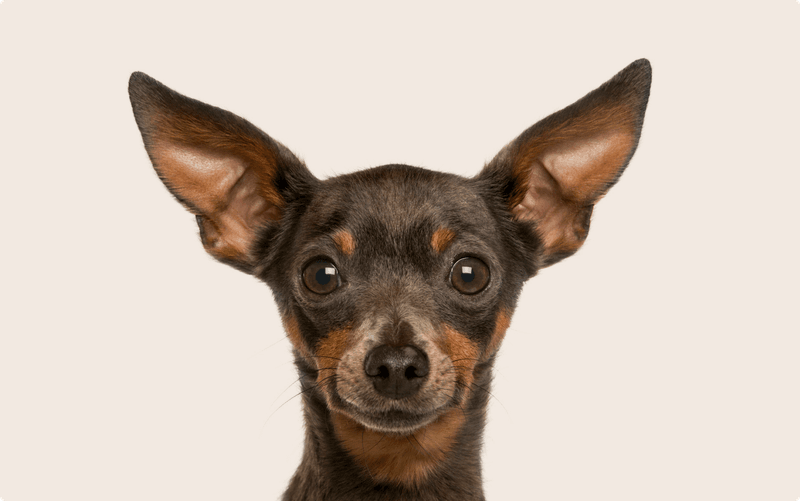
Miniature Pinschers, known for their boldness, may become stressed in unfamiliar settings. Their independent nature benefits from early socialization and consistent training. Introduce them to varied environments gradually to build confidence.
Engage them in interactive play and provide mental challenges to satisfy their curiosity.
Ensuring a routine that includes regular exercise and social interaction can prevent anxiety. Creating a secure space within the home where they can observe their surroundings helps them feel safe and reduces stress, keeping their spirited personality in check.
Scottish Terrier

Scottish Terriers, with their strong-willed nature, can experience stress without proper boundaries and leadership. Consistent training and clear commands help manage their independent streak. Engage them with games that challenge their minds and bodies, such as tracking exercises.
Regular, structured walks in familiar surroundings provide security and reduce anxiety.
Interactive toys and puzzles keep them occupied, preventing boredom. Ensuring they have a quiet retreat where they can unwind helps maintain their calm demeanor, promoting a balanced and content lifestyle.
Lhasa Apso

Lhasa Apsos, bred as guard dogs, can be wary and stressed in new environments. Their keen senses make them more alert to changes, which can lead to anxiety. Establish a stable, consistent routine to provide a sense of security.
Allow them to acclimate to new situations at their own pace, ensuring they feel safe.
Regular grooming and gentle handling can build trust, reducing stress. Providing a quiet, comfortable area where they can retreat when needed helps maintain their tranquility, ensuring they remain calm and happy.
French Bulldog
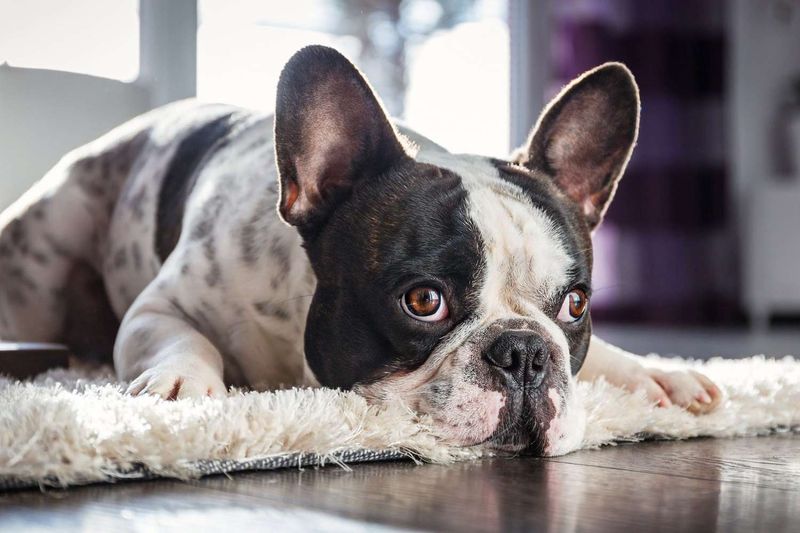
French Bulldogs, known for their playful nature, can become stressed without enough human interaction. Their social disposition thrives on companionship, making them prone to separation anxiety. Ensure they have company or interesting toys to keep them occupied.
Regular, moderate exercise, such as walks in the park, helps manage their energy levels.
A predictable routine, with set mealtimes and bedtime, further reduces stress by providing stability. Creating a loving environment with plenty of attention ensures they stay relaxed and content, embracing their cheerful personality.
Cocker Spaniel

Cocker Spaniels, celebrated for their friendliness, may experience stress if not properly socialized. Their need for human interaction makes loneliness a trigger for anxiety. Engage them in family activities to ensure they feel included.
Regular grooming and gentle handling foster trust and security.
Short, fun play sessions in the backyard or park keep them active and happy. Consistent training and clear communication help manage their emotions, ensuring they remain calm and well-adjusted. Creating a secure home environment filled with love and attention keeps them content.
Pomeranian
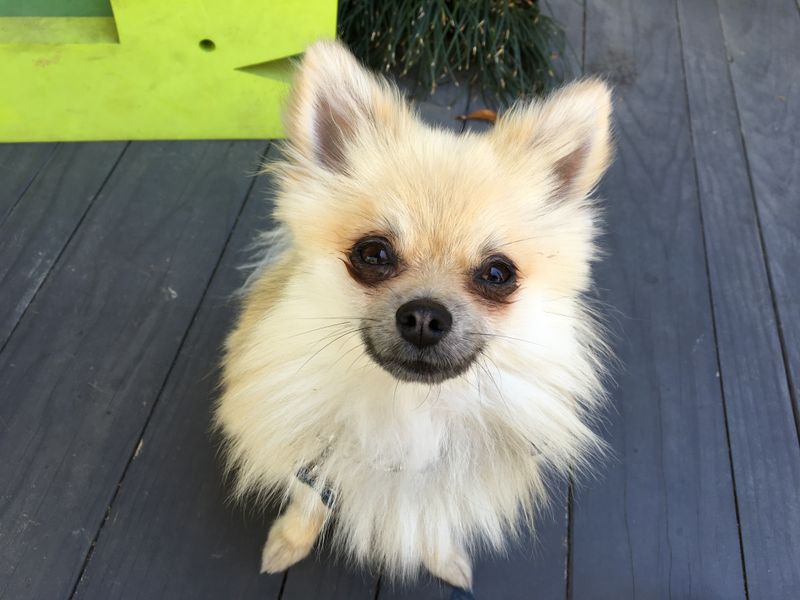
Pomeranians, with their fluffy coats and lively personalities, often feel stress if not accustomed to grooming routines. Introduce grooming slowly, making it a positive experience with treats and praise.
Regular short walks help manage their energy levels and prevent boredom.
Ensuring they have a dedicated play area within the home offers a space where they can express their playful nature freely. Routine and structure provide a sense of security, reducing anxiety. Spending quality time with them ensures they feel loved and cherished, keeping their spirits high.
Boston Terrier

Boston Terriers, often dubbed “the American Gentleman,” thrive on human interaction and can become stressed when left alone. Their social nature means they need companionship to stay happy. Engage them in family activities or play sessions, ensuring they feel involved.
Regular walks and games like fetch provide an outlet for their playful energy.
A structured routine, combined with positive reinforcement training, helps maintain their confidence. Creating a loving and interactive home environment ensures they remain joyous and stress-free, embracing their affectionate personality.
Dachshund

Dachshunds, with their inquisitive nature, can become stressed if unable to explore their surroundings. Encourage their natural curiosity by taking them on exploratory walks in varied environments.
Socialization is key; introduce them to new experiences gradually to build their confidence.
Interactive toys and games that challenge their minds are beneficial. Providing a consistent routine with regular exercise helps maintain their well-being. Ensuring they have a cozy space to retreat to when needed offers comfort and security, reducing stress and promoting a happy, balanced lifestyle.
Papillon
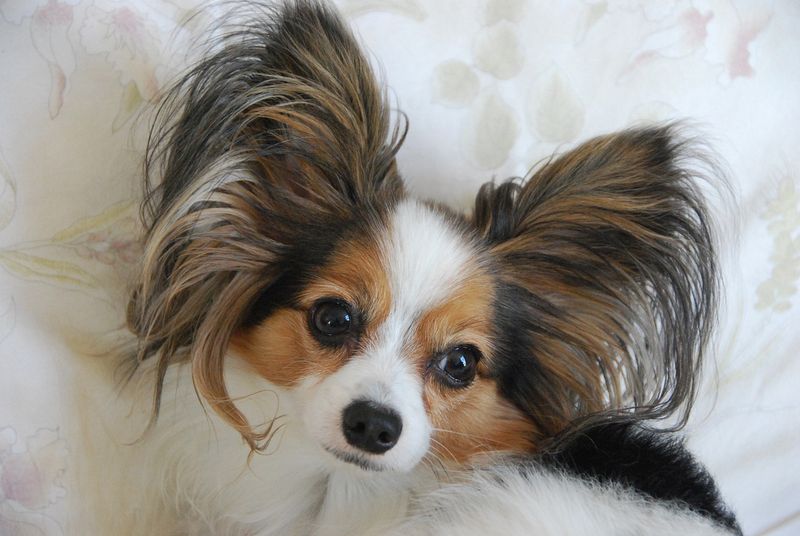
Papillons, known for their grace and agility, can experience stress if not mentally or physically stimulated. Their lively nature benefits from activities like agility courses or advanced obedience training.
Keeping them engaged with interactive toys or puzzle games satisfies their intellect.
Regular walks and playtime in secure areas ensure they remain active and content. Establishing a routine that includes varied activities provides structure and security, reducing anxiety. Creating a nurturing environment where they feel loved and challenged ensures they thrive, maintaining their spirited joy.
Sheltie (Shetland Sheepdog)

Shelties, with their herding instincts, can become stressed when not given a purpose. These intelligent dogs need mental and physical stimulation to thrive. Engage them in herding activities or agility training to fulfill their need for action.
Regular walks and playtime with other dogs can also help channel their energy.
A consistent routine that includes varied tasks ensures they remain happy and well-adjusted. Providing a role within the family, such as fetching items, can boost their confidence and reduce anxiety, keeping them content and focused.

